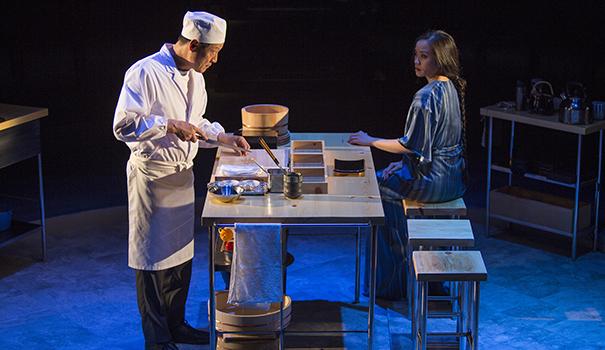
Por Charlene Baldridge
The Old Globe – in the midst of Shakespeare First Folio activities – managed to pull off a coup June 2 with the opening of Kimber Lee’s “tokyo fish story.” All lower case and playing to a capacity audience, the exquisite, understated production continues through June 26.
Set in present-day Tokyo, the delicate, brilliantly directed (by May Adrales) and produced play affords an opportunity for San Diego theater mavens to breathe after the hype of Hollywood and the angst of reinterpreted Chekov. The playwright of “tokyo fish story” allows us room to ponder the unsaid and the things we may not be meant to understand.

The play concerns a formerly prosperous sushi restaurant run by veteran sushi maker and owner steeped in the tradition, Koji (James Saito). Koji’s is located in a once thriving, now declining neighborhood in which most of the other businesses, including the print shop that did his first menu, have closed or moved on. The only competitor is an upstart sushi restaurant that serves trendy appetizers and dessert. People are flocking there and abandoning Koji, who doesn’t take any bluefin before its prime from the local tuna dealer.
Getting on in years but unwilling to admit it, Koji has trouble keeping employees, who apprentice for many years before being allowed to wield the knife in any serious capacity. Of some longevity is Takashi (Tim Chiou), who has served as Koji’s apprentice for nearly 20 years — all but one, in which he went to the U.S. to be with his ailing mother. Not quite so dedicated is Nobu (Raymond Lee), who is more forward-looking than traditional.

When an apprentice doesn’t show up, two hopefuls apply for the job. Koji hires the male, played by Jim Norman Schneider, a masterful physical comedian whose character has “issues” to say the least and who does not last more than a few days. Schneider adeptly plays all the other young males in the play, including the Tuna Dealer apprentice.

The other job applicant is Ama Miyuki (Tina Chilip), who returns determined to overturn the unwritten no-woman-in-sushi tradition. Miyuki also portrays another woman — one of symbolic importance, also named Ama — who haunts Koji’s long, early morning bike rides to the fish market.
The actors have forged a tight ensemble, never over-stressing to make a point. Lee’s delicate, affecting text and the age-old juxtaposition of tradition vs. progress are allowed to unfold at a stately pace, that is, until a strange occurrence changes everything.
 Scenic designer Mikiko Suzuki McAdams conspires with composer/sound designers Charles Coes and Nathan A. Roberts to give the sushi preparations a voice without an odor. Except for a few pieces at the climax of the play, no actual fish is present, but we do hear the rice-washing without rice, the octopus-massaging without flesh, the slicing and chopping, etc. We become acquainted with the daily ritual and are awed by the timing and detail it takes to produce that one exquisite morsel clinging to a bit of rice, so perfect and delicious.
Scenic designer Mikiko Suzuki McAdams conspires with composer/sound designers Charles Coes and Nathan A. Roberts to give the sushi preparations a voice without an odor. Except for a few pieces at the climax of the play, no actual fish is present, but we do hear the rice-washing without rice, the octopus-massaging without flesh, the slicing and chopping, etc. We become acquainted with the daily ritual and are awed by the timing and detail it takes to produce that one exquisite morsel clinging to a bit of rice, so perfect and delicious.
The same could be said of the entire production and its other contributors, David Israel Reynoso (costumes) and Jiyoun Chang (lighting).
—Charlene Baldridge ha estado escribiendo sobre las artes desde 1979. Siga su blog en charlenebaldridge.com o comuníquese con ella en [email protected].








